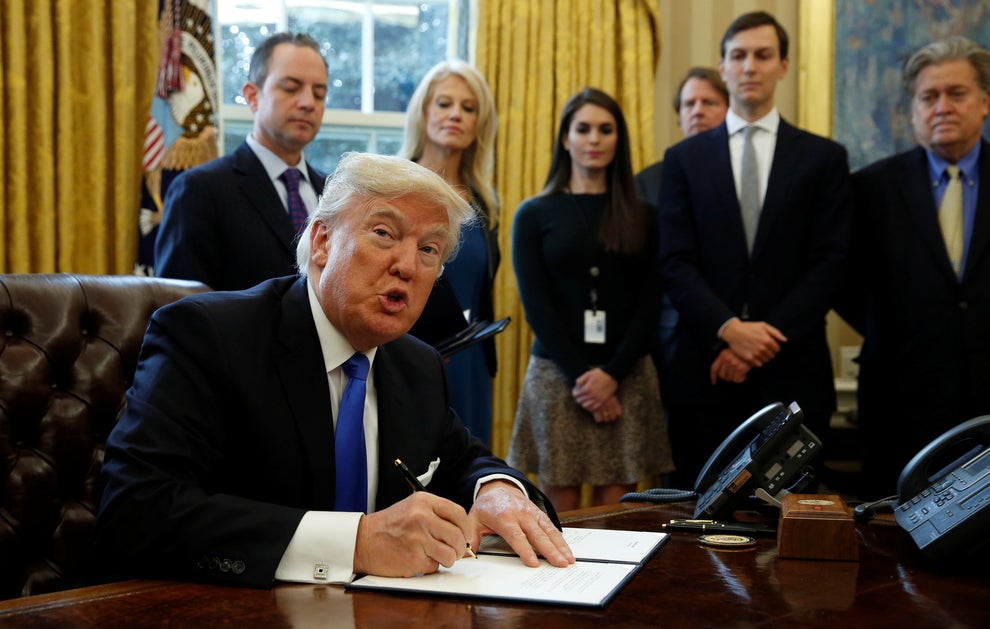Muslim Groups Are Bracing For Trump To Stop Muslim Immigration.
Muslim advocacy and civil liberty groups are planning for Trump’s potential executive action on a so-called Muslim ban that infringes on Muslim or immigrant civil liberties.

President Donald Trump signs an executive order to advance construction of the Keystone
XL pipeline at the White House in Washington on January 24.
Muslim civil liberties groups are preparing for President Donald Trump to issue executive orders that would institute a blanket suspension of visas issued to certain countries with majority Muslim populations, temporarily suspend the refugee resettlement program, and institute what Trump has called “extreme vetting,” or as one person called it, “a Sharia litmus test.”
An official at one of those groups — prominent in the Muslim community — told BuzzFeed News that a career government official said Trump would take action on the above measures soon. Two officials at another prominent group said they had heard secondhand that action may soon be taken on these measures.
A US official told BuzzFeed News that, to date, the Trump administration has for the most part not consulted the relevant government agencies before releasing executive actions. A State Department official said that they were unaware of any impending order.
Reuters on Tuesday evening, citing congressional aides, reported that Trump was expected to sign executive orders that limited immigration for refugees “and some visa holders from Iraq, Iran, Libya, Somalia, Sudan, Syria and Yemen.”
“We are preparing for the inevitability of what kind of ‘Muslim ban’ will be implemented, and we’re working with coalition partners to develop a strategy to defend rights and religious freedoms,” said Ibrahim Hooper, National Communications Director and spokesperson for CAIR, told BuzzFeed News. Hooper added that CAIR is in contact with a “broad spectrum” of Muslim, Arab-American, civil liberty, immigration, and refugee organizations to collaborate with on litigation when the time comes.
Asked if any litigation is already prepared, Hooper said, “Everybody is poised, waiting to see what the language is of this version of the Muslim ban, and we’ll go from there. Because until you see the specific language it’s difficult to react.”
Hoda Hawa, Director of Advocacy and Policy at the Muslim Public Affairs Council, said they would be taking a three-pronged approach to addressing any such executive action, whether it concerns Muslims or any other minority group.
Hawa said they would partner with groups whose primary expertise is in the legality of any actions, while simultaneously working with the media and press to ensure the conversation about the controversial ban remains, and lastly, work with allies on Capitol Hill.
The White House didn’t immediately return a request for comment.
During his campaign, Trump discussed two overlapping proposals affecting Muslim immigrants and Muslim Americans: Proposing a ban on Muslim immigrants into the country and calling for a Muslim registry.
“Donald J. Trump is calling for a complete and total shutdown of Muslims entering the United States until our country’s representatives can figure out what the hell is going on,” Trump said, later amending the proposal to include immigrants from “terror-prone regions.”
And with the change in language, focusing on an immigrant’s region or country, rather than religion, the ban is entirely possible.
The ban of immigrants from Muslims countries is not new. The nation had a similar program in place after 9/11, called NSEERS.
In fact, Kansas Secretary of State Kris Kobach, an immigration hardliner who authored NSEERS, was photographed with Trump soon after the election holding a “strategic plan” that appears to revive the registry program. NSEERS, which stands for the National Security Entry-Exit Registration System and was active for almost 10 years, was a system that made male immigrants from 25 majority-Muslim countries register, check in with immigration officers, and have their fingerprints taken.

Drew Angerer / Getty Images
NSEERS never led to any prosecution of terror suspects, but did result in the deportation of a few thousands people, mainly those who had overstayed their visa.
“Muslim Advocates is prepared to protect the rights of Americans of all faiths. Together, with our allies from countless communities, we are ready to fight back, protect our nation’s freedoms, and stand up for what’s right,” Muslim Advocates, a civil liberty organization, said in a statement to BuzzFeed News. “Muslim Advocates will be using every resource and legal and advocacy tool available to ensure that steps that are taken in the name of national security do not erode our core values of freedom, equality and justice for all.”
Similarly, Ken Kimerling, Legal Director of Asian American Legal Defense and Education Fund said, “We don’t have a lawsuit in our back pocket but we’re willing to litigate issues regarding muslim registries,” adding that his organization has helped file litigation for behalf of Muslim Americans in the past.
“I can tell you, we’ve been clear about the fact that the constitution prohibits religious discrimination, even in the context of religion,” said Omar Jadwat, director and attorney at the ACLU’s Immigrants’ Rights Project. “I can’t tell you for sure we’re going to sue over something we haven’t seen, especially on the basis of fourth-hand rumors, but you can be sure we are taking very seriously the possibility of litigation in this area.” Jadwat added.
“The question is what is he actually going to announce.”
In addition to civil liberty organization, Senate Democrats, too, have drafted legislation aimed at blocking executive action that would make a registry that is structured around national origin, nationality, and religion.
No comments :
Post a Comment